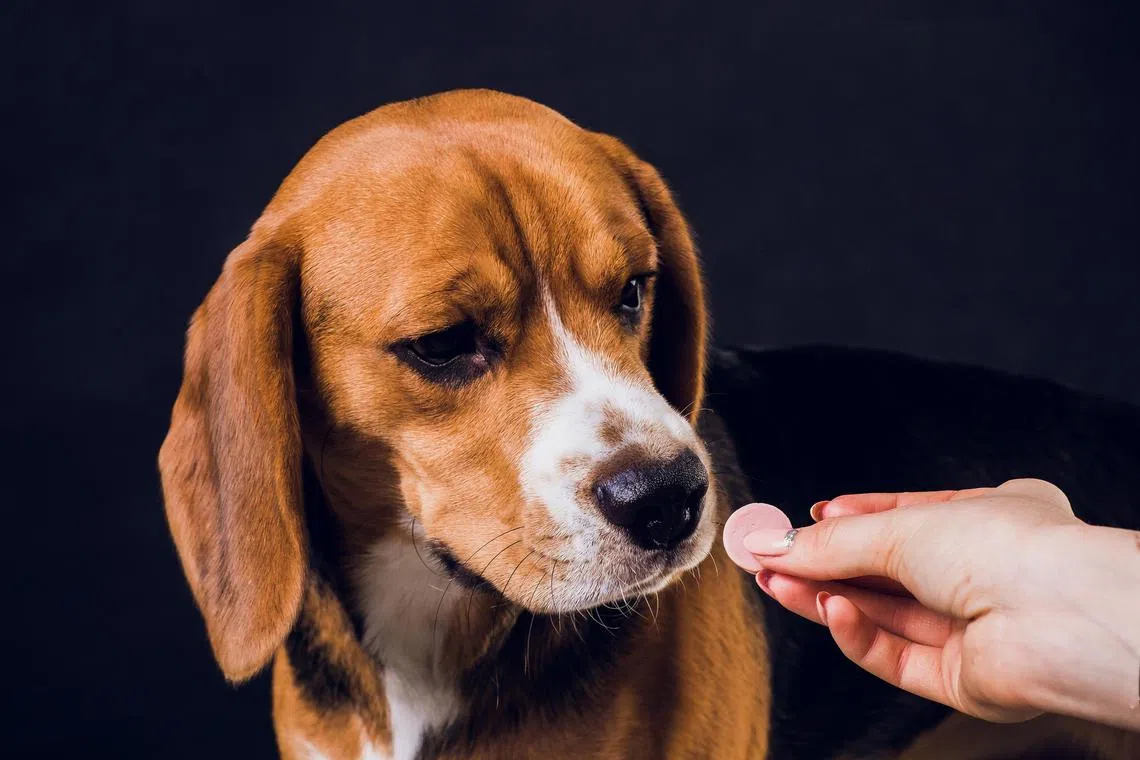Vet Talk: Are you ‘paw-sitive’ your pet is eating safely during this festive season?
Sign up now: Get ST's newsletters delivered to your inbox

New owners have to take note of the certain types of food their pets should not consume.
PHOTO: ISTOCKPHOTO
Marc Teo
Follow topic:
SINGAPORE – Pet ownership is on the rise in Singapore, with many families treating their furry companions as one of their own.
But new owners have to take note of the certain types of food their pets should not consume. Ingestion of undesirable items can occur when owners give these to their pets without any prior knowledge of the risks or when pets accidentally eat the items.
While it is common knowledge that pets should not swallow household products, household chemicals or toys, some owners may not be aware that certain foods, though relatively innocuous to humans, can be harmful to their pets.
This is of greater concern during festive periods, when unfamiliar foods and items such as festive decorations are readily accessible to them. Here are some tips on pet health and safety.
Risks associated with certain foods and items
For instance, the consumption of xylitol – a sweetener that can be found in foods such as peanut butter, candy and chewing gum, as well as in common household products like mouthwash – can result in a critical drop in blood glucose levels or liver impairment.
Other examples include the accidental ingestion of durian seeds, avocado pits, string and rubber products like rubber bands and door stoppers, all of which have the potential to cause obstructions in the gastrointestinal system.
Ingesting a piece of string may not sound serious, but it can result in intestinal plication as the foreign object causes folding of the intestines, which requires surgery to fix.
Some houseplants – such as aloe vera, castor bean, foxglove, jade plant, lilies, monstera, oleander, philodendron, snake plant and yew – can be harmful to pets.
With the popularity of online shopping, which may offer attractive prices and convenience, some pet owners are more inclined to buy medications and preventatives online rather than from veterinary clinics.
However, what is advertised online may not be the genuine product. Administering counterfeit medications may carry inherent risks, including ineffective treatment. In more severe cases, it can result in toxicity.
What should I do if my pet has ingested something suspicious?
Seek veterinary advice and attention immediately. Your veterinarian will be able to advise you if the food item is safe for consumption. He or she may also recommend taking your pet to the clinic or refer you to another veterinary facility if the situation warrants further diagnostics or overnight monitoring.
It is important not to take for granted that foods consumed by humans – even grapes, garlic and raw bread dough – are by default safe for pets.
Theobromine and caffeine are examples of active ingredients that can be toxic to companion animals. These ingredients can be found in chocolates and coffee beans.
There are reported cases of chocolate intoxication in dogs, resulting in muscle tremors, cardiac arrhythmias, seizures or even death.
Chocolate intoxication is a serious condition that warrants immediate veterinary attention.
If detected early enough, the veterinarian can induce vomiting to reduce the toxic exposure of the chocolate. Hospitalisation may also be recommended to administer supportive therapy and provide intensive monitoring.
Responsible pet ownership
Owning a pet can be a fulfilling journey, but it comes with great responsibility.
By understanding the dangers of certain foods, household products or counterfeit medication, you can then take the necessary measures to keep your pet safe.
Dr Marc Teo is a veterinarian at the Animal & Veterinary Service.
Vet Talk is a fortnightly column where veterinarians offer advice on pet issues.

